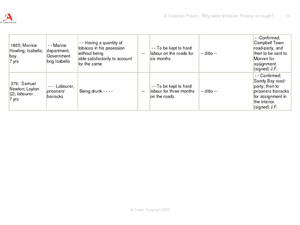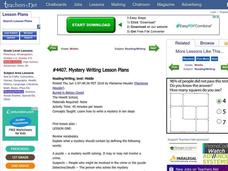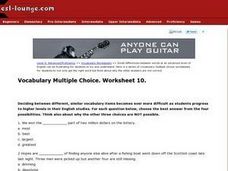Curated OER
A Victorian Prison
Prisons in Victorian England were miserable places, designed to deter people from committing crimes. To understand why these prisons were so tough, young historians review documents and pictures from Coldbath Fields prison. After...
Curated OER
Hate-Crimes and Punishment
Young scholars research and write about the effectiveness of hate-crime legislation in the United States
BBC
Crime
Crime and punishment! Learners discuss the law, civics, and crime in the UK. They brainstorm lists of crimes and possible punishments, complete activities on a website, role-play a Juvenile Court scenario, and try to think of ways they...
Curated OER
Do We Need a Permanenet International Criminal Court?: War Crimes, Violence, International Law and Politics, Nuremberg
In this lesson, students explore the history, relevance and current application of international tribunals for war crimes. Students look at cases from the Nuremberg trials, Tokyo trials and the Bosnian War.
Curated OER
Character's Motive
Why do people commit crimes? Middle schoolers investigate characters' motives for committing a crime in a character analysis lesson. First, they read the book Chasing Vermeer and identify the suspects. They then record the details about...
Curated OER
Crime and Deviance
In this Crime and Deviance worksheet, students read and answer questions, including applying theories to current events and writing a response to an essay question.
Mr. Roughton
CSI: Florence
Who done it? Class groups adopt the role of crime scene investigators and examine exhibits (primary source documents) to determine who attempted to assassinate the members of the Medici dynasty.
Novelinks
The Westing Game: Anticipation Guide
Are all criminals bad people? Pupils answer this and other compelling questions in an anticipation guide for The Westing Game by Ellen Raskin. Designed for learners to complete before reading the text, the...
Facing History and Ourselves
The Range of Choices
Learners examine crimes against human rights. In this world history instructional activity, high schoolers watch a segment of a video about the Armenian Genocide. Learners reflect on the crimes of the Ottoman government in classroom...
Curated OER
Stereotypes
Assumptions and misconceptions are two things that underlie stereotypes. Introduce youngsters to the concept of stereotyping with a role-play activity. They pretend they are employees at a restaurant who have accused a person of...
Curated OER
Binge Drinking and Drug Use
Students critically evaluate young peoples' comments on under age drinking. They map out valleys tieing together communities and drinking problems in a variety of situation. In addition, they correlate drinking and education in schools...
Curated OER
Jack the Ripper: Limitations of the Police Force
For this British law enforcement worksheet, learners learn why police had such difficulty tracking down and capturing 'Jack the Ripper' in the Whitechapel murders of 1888. Three questions are listed for students to complete.
Curated OER
Lord of the Flies Introduction
Twelfth graders, as an introduction to a unit on The Lord of the Flies, participate in an activity in which they demonstrate how good people can do things that they know are wrong. They discuss peer pressure and "why good people do bad...
Facing History and Ourselves
Exploring Raphael Lemkin's Actions: The Invention of the Word "Genocide"
Learners examine the contributions of Raphael Lemkin. For this genocide activity, students consider how Lemkin defined the atrocities of the Holocaust as he coined the term "genocide." Learners discuss the definition of genocide as well...
Facing History and Ourselves
Denial and Free Speech
Learners explore the meaning and implications of genocide. For this Armenian genocide activity, learners investigate the genocide that took place in Turkey.
Curated OER
Death penalty debate
Students debate the motion, "the USA is right to have capital punishment." Students begin by researching and writing their arguments to support or oppose the motion. After the debate, students vote according to their beliefs.
Curated OER
Dishonesty: Clues and Consequences
Young scholars explore trustworthiness and dishonesty. In this character development lesson, students discuss dishonest behavior. Young scholars develop scenarios about dishonesty and decide what consequences the person should have.
Curated OER
Make War, Not Love?
In this war worksheet, students complete 4 activities that address war terminology and opinions.
Curated OER
Mystery Writing Lesson Plans
Introduce your class to the genre of mystery. Included is a vocabulary list, a rubric, and a sample mystery story called "Lethal Lesson." There are very limited directions on what to do with these resources, so you will need to plan some...
Curated OER
Family Matters
In this family matters worksheet, students, with a partner, explore, discuss and complete a variety of activities associated with families and all the responsibilities of one.
Curated OER
Vocabulary Multiple Choice Worksheet 10
In this ESL vocabulary worksheet, learners read 10 sentences that have words omitted. Students analyze the 4 similar choices given and select the word that best completes each sentence.






















